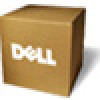Dell 5310n Mono Laser Printer User's Guide - Page 50
Labels
 |
View all Dell 5310n Mono Laser Printer manuals
Add to My Manuals
Save this manual to your list of manuals |
Page 50 highlights
using with the printer before buying large quantities. See Loading the Multipurpose Feeder and Loading the Envelope Feeder for instructions on loading envelopes. NOTE: When using the envelope feeder, you may hear a "thumping" noise. This noise is normal; it occurs when trapped air is forced out of the envelopes before printing. When printing on envelopes: l To achieve the best possible print quality, use only high-quality envelopes that are designed for use in laser printers. l Set the Paper Size/Type in the Paper menu to MP Feeder, Manual Env, or Env Feeder depending on the source you are using. Set the paper type to Envelope, and select the correct envelope size from the operator panel, the printer driver, or the Local Printer Setup Utility. l For best performance, use envelopes made from 75 g/m2 (20 lb bond) paper. You can use up to 105 g/m2 (28 lb bond) weight for the multipurpose feeder or 105 g/m2 (28 lb bond) weight for the envelope feeder as long as the cotton content is 25% or less. Envelopes with 100% cotton content must not exceed 90 g/m2 (24 lb bond) weight. l Use only new, undamaged envelopes. l For best performance and to minimize jams, do not use envelopes that: ¡ Have excessive curl or twist. ¡ Are stuck together or damaged in any way. ¡ Contain windows, holes, perforations, cutouts or embossing. ¡ Use metal clasps, string ties, or metal folding bars. ¡ Have an interlocking design. ¡ Have postage stamps attached. ¡ Have any exposed adhesive when the flap is in the sealed or closed position. ¡ Have nicked edges or bent corners. ¡ Have rough, cockle, or laid finishes. l Use envelopes that can withstand temperatures of 230°C (446°F) without sealing, excessive curling, wrinkling, or releasing hazardous emissions. If you have any doubts about the envelopes you are considering using, check with the envelope supplier. l Load only one size of envelope at a time in the envelope feeder. l A combination of high humidity (over 60%) and the high printing temperatures may seal the envelopes. Labels The printer can print on many labels designed for use with laser printers. These labels are supplied in letter size, A4 size, and legal size sheets. Label adhesives, face sheet (printable stock), and topcoats must be able to withstand temperatures of 230°C (446°F) and pressure of 25 pounds per square inch (psi). Try a sample of any labels you are considering using with the printer before purchasing a large quantity. After printing approximately 10,000 pages of labels (or each time you replace the print cartridge), complete the following steps to maintain printer feeding reliability: 1. Print five sheets of paper. 2. Wait approximately five seconds. 3. Print five more sheets of paper. When printing on labels: l Set the Paper Size/Type menu item to Labels in the Paper menu. You can set the Paper Size/Type from the printer operator panel, the printer driver, or the Local Printer Setup Utility. l Feed vinyl labels from the standard tray or the optional 250- or 500-sheet drawers. For vinyl labels, set the Paper Type to Labels, the Labels Texture to Smooth, and the Label Weight to Heavy, or set the Paper Type to vinyl labels and the texture and weight to Normal. l Do not load labels with paper or transparencies in the same source; mixing print media can cause feeding problems and print quality problems.















